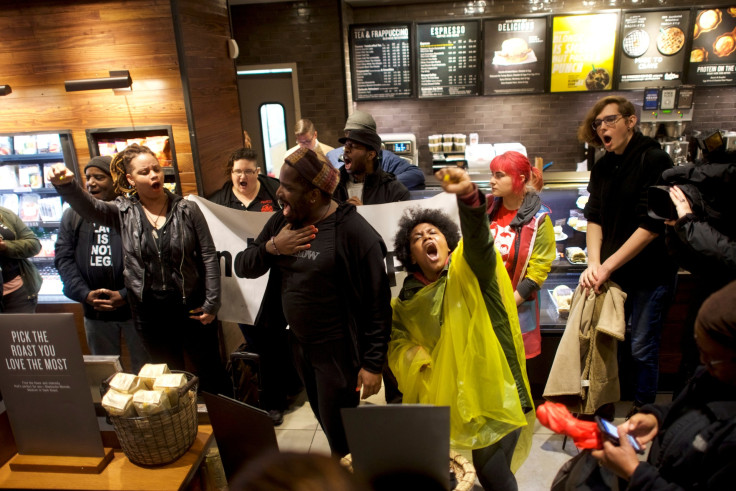Starbucks’ ‘Third Place Policy’: How Will It Affect Paying Customers?

Starbucks on Saturday announced its new “Third Place Policy” where “any customer is welcome to use Starbucks spaces, including our restrooms, cafes and patios, regardless of whether they make a purchase.”
The initiative is to ensure the coffeehouse chain is “committed to creating a culture of warmth and belonging where everyone is welcome,” and is likely to be a breath of fresh air to anyone who has wanted to use the washroom or just warm up for a bit on a bitingly cold winter’s day but did not either have the time or wish to dish out the $4 or so for the privilege.
Indeed, the initiative “intended to help maintain the third place environment in alignment with our mission ‘to inspire and nurture the human spirit – one person, one cup and one neighborhood at a time,’” will do some mending with regards to the company’s public and brand image.
Last month, the company faced backlash after two black men were arrested in Philadelphia. They were denied restroom privileges owing to the fact that they had not purchased anything. Cellphone footage of the ensuing arrest of the two men for trespassing by police emerged and the backlash that followed prompted CEO Kevin Johnson to call the incident “reprehensible,” Fox News reported. Johnson said the company had made a “mistake.”
“We are reviewing our policies and will continue to engage with the community and the police department to try to ensure these types of situations never happen in any of our stores,” a statement from Starbucks read via Twitter.
We apologize to the two individuals and our customers for what took place at our Philadelphia store on Thursday. pic.twitter.com/suUsytXHks
— Starbucks Coffee (@Starbucks) April 14, 2018
Among mixed reactions and speculation, however, the decision did raise a few questions on forums subreddits and Twitter about how exactly Saturday’s “Third Place Policy” would work in reality. It also raised the question of what is a customer. Can a person be a customer if he does not buy anything and if so, is this fair on customers that pay?
As far as Starbucks’ new policy goes, their statement read: “This policy applies to all customers and Starbucks employees (“partners”). For the purposes of this policy, any person who enters our spaces, including patios, cafes and restrooms, regardless of whether they make a purchase, is considered a customer.”
Former Republican Congressman and now conservative talk radio host Joe Walsh tweeted: “Bathrooms are now open to everyone. Including the homeless, who are also now allowed to just hang out. Classic leftist mindset: intentions are more important than results.” Twitter user Scale Tipper simply replied to this: “Classic human kindness.”
.@Starbucks new policy: No longer do you have to buy something to use the bathroom. Bathrooms are now open to everyone. Including the homeless, who are also now allowed to just hang out.
— Joe Walsh (@WalshFreedom) May 11, 2018
Classic leftist mindset: intentions are more important than results. https://t.co/L3qMjc24fu
In a Starbucks subreddit, a user asked employees what they feel “about the new corporate policies on sitting without ordering and bathroom use by non-customers? Do they encourage freeloaders or put employees at risk?”
User Bcston replied to this: “It already was the policy in my store and probably a lot of other suburban locations,” to which user 214b enquired “Do you ever have a problem with overcrowding or non-customers making a mess in the bathroom?”
Bcston said this happened occasionally. “We have a pretty substantial homeless population in our area. But it’s typically 1 or 2 non-paying customers at a time, and if anything nonpaying customers are way more conscientious of cleaning up after themselves and throwing away their trash than the doctors and business men who spend 6 hours taking up a whole damn table after buying one coffee. Plus they’ll usually tip us a dollar or two for the water.”
User Isthismydrink replied: “At my store, we were never allowed to kick out customers that didn’t buy anything. And we don’t have a code on our bathrooms so anyone can use them. We do have a large majority of homeless people that steal our toilet paper/mess up our bathrooms and sleep in our lobby. Nothing we could do about it then and there’s nothing we can do about it now.”
The policy did set out some boundaries with regards to acceptable behavior. Starbucks requested that customers — paying and non-paying — maintain the warm, welcoming atmosphere the policy intends to create by using spaces as they intended, being considerate of others, communicating with respect and by acting responsibly.
In such an event that behavior leads to disruption of “the third place environment and interferes with the Starbucks Experience for others, Starbucks partners should follow the ‘Addressing Disruptive Behaviors’ procedure,” the policy said.
“On occasion, the circumstances of a customer’s disruptive behavior may make it necessary to prohibit that customer from returning to our stores. In these situations, Starbucks partners should follow ‘Requesting A Customer Restriction’ procedure,” it added.
© Copyright IBTimes 2025. All rights reserved.






















